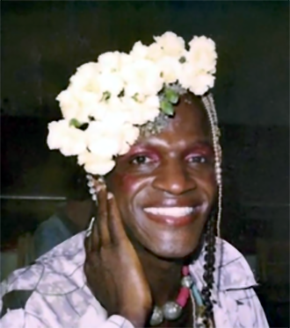Pride Month: Marsha P. Johnson
 The Stonewall Inn on Christopher Street in New York City, is the first LGBT National Historic Landmark in American history, however the battle for LGBT rights in that part of town has gone on for much longer. In 1969, police raided the Stonewall Inn, arrested patrons who were known to be LGBT on questionable charges and forced them into police cars. Riots ensued, called “the Stonewall Riots”, and although many point to Marsha P. Johnson as the catalyst for the riots by throwing the first brick, she has denied it. Regardless of who “started the riots,” we understand, and acknowledge that Pride Month would not be possible without the work of black and latinx, queer and trans women of color, whose activism began before Stonewall, and have laid the framework for queer liberation against an oppressive, heteronormative, racist, capitalist, police state.
The Stonewall Inn on Christopher Street in New York City, is the first LGBT National Historic Landmark in American history, however the battle for LGBT rights in that part of town has gone on for much longer. In 1969, police raided the Stonewall Inn, arrested patrons who were known to be LGBT on questionable charges and forced them into police cars. Riots ensued, called “the Stonewall Riots”, and although many point to Marsha P. Johnson as the catalyst for the riots by throwing the first brick, she has denied it. Regardless of who “started the riots,” we understand, and acknowledge that Pride Month would not be possible without the work of black and latinx, queer and trans women of color, whose activism began before Stonewall, and have laid the framework for queer liberation against an oppressive, heteronormative, racist, capitalist, police state.
Marsha P. Johnson, from New Jersey, struggled to express her true gender growing up, being raised in the Roman Catholic faith. After moving to New York and living life on the streets to make ends meet, Marsha became a fixture as a drag queen on Christopher Street, a life she loved with a style that she cultivated through thrift shops. As she became prominent, she began giving back to the LGBT community, serving as a “drag mother” for other LGBT youth who were homeless or struggling with their identities. She and Sylvia Rivera co-founded STAR, the Street Transvestite Action Revolutionaries, to provide shelter for homeless LGBT youth and advocate for the population as a whole. Due to her status as an African-American transgender woman, her advocacy and activism was often pushed to the side as LGBT rights were fought for on behalf of cisgender whites. Tragically, Marsha P. Johnson’s body was found in the Hudson River and ruled a suicide, though her loved ones insisted she wasn’t in a depressed state of mind.
48% of transgender and gender non-conforming individuals report postponing seeking care when sick or injured and 50% report postponing preventative care, statistics that can extend to reproductive health.[1] 28% of transgender and gender non-conforming individuals report facing harassment in medical settings. [2] At the Reproductive Health Access Project, we have been working with clinicians who specialize in trans health care to create our newest patient education material “Birth Control Across the Gender Spectrum .” As we continue striving to make our work gender inclusive, it goes beyond our materials, making sure that the clinicians we train and support create safe spaces for transgender and gender non-conforming individuals to receive the reproductive health care that they need.
